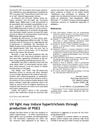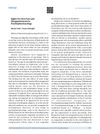198 citations,
June 2013 in “Molecular psychiatry” Schizophrenia patients' stem cells show abnormal neuron development and mitochondrial issues.
 7 citations,
October 2006 in “Medical hypotheses”
7 citations,
October 2006 in “Medical hypotheses” UV light might cause excessive hair growth by increasing PGE2 in the skin.
 197 citations,
January 2019 in “Neuropsychopharmacology”
197 citations,
January 2019 in “Neuropsychopharmacology” Male and female bodies respond differently to stress, influenced by hormones and development stages, with implications for stress-related diseases.
 57 citations,
April 2019 in “British journal of dermatology/British journal of dermatology, Supplement”
57 citations,
April 2019 in “British journal of dermatology/British journal of dermatology, Supplement” Alopecia areata involves immune system imbalances that may lead to depression and anxiety.
 40 citations,
April 2018 in “Endocrine”
40 citations,
April 2018 in “Endocrine” PFS and PSSD are similar conditions with persistent sexual dysfunction after stopping medication.
 36 citations,
June 2001 in “Neuroscience Letters”
36 citations,
June 2001 in “Neuroscience Letters” Finasteride may affect fetal brain development and increase arousal, but more research is needed for safety confirmation.
 25 citations,
June 2017 in “Scientific reports”
25 citations,
June 2017 in “Scientific reports” Stress worsens Tourette symptoms by increasing allopregnanolone levels.
 18 citations,
March 2017 in “International clinical psychopharmacology”
18 citations,
March 2017 in “International clinical psychopharmacology” Inositol was not more effective than a placebo in treating trichotillomania.
 15 citations,
February 2019 in “Journal of clinical medicine”
15 citations,
February 2019 in “Journal of clinical medicine” Atorvastatin reversed memory problems caused by cancer drug trastuzumab and improved its cancer-fighting abilities without causing hair loss.
 12 citations,
January 2013 in “Alcohol and Alcoholism”
12 citations,
January 2013 in “Alcohol and Alcoholism” Alcohol in teen years leads to more adult drinking, finasteride doesn't help.
 10 citations,
November 2022 in “Protein & Cell”
10 citations,
November 2022 in “Protein & Cell” Quercetin significantly helps hair growth by activating hair follicles and improving blood vessel formation around them.
 7 citations,
May 2013 in “Optometry and vision science”
7 citations,
May 2013 in “Optometry and vision science” Bimatoprost can help regrow eyelashes in people with trichotillomania.
 5 citations,
August 2013 in “InTech eBooks”
5 citations,
August 2013 in “InTech eBooks” KLF4 is important for maintaining stem cells and has potential in cancer treatment and wound healing.
 4 citations,
February 2019 in “Biological Trace Element Research”
4 citations,
February 2019 in “Biological Trace Element Research” Chromium salts may help with insulin sensitivity in PCOS, but more research is needed to confirm their overall effectiveness and safety.
 3 citations,
September 2018 in “Journal of Biomaterials Science, Polymer Edition”
3 citations,
September 2018 in “Journal of Biomaterials Science, Polymer Edition” Different materials affect the growth of brain cells and fibroblasts, with matrigel being best for brain cell growth.
 3 citations,
June 2014 in “Klinik Psikofarmakoloji Bulteni-bulletin of Clinical Psychopharmacology”
3 citations,
June 2014 in “Klinik Psikofarmakoloji Bulteni-bulletin of Clinical Psychopharmacology” The document concludes that there is hope for future psychopharmacology research despite challenges in treating schizophrenia.
 2 citations,
July 2019 in “Journal of psychology & clinical psychiatry”
2 citations,
July 2019 in “Journal of psychology & clinical psychiatry” Zinc helps reduce the severity of depression.
 August 2023 in “Research Square (Research Square)”
August 2023 in “Research Square (Research Square)” Two microRNAs affect hair follicle development in sheep by targeting specific genes.
 November 2022 in “Research Square (Research Square)”
November 2022 in “Research Square (Research Square)” The research provides insights into hair follicle growth in forest musk deer by identifying key genes and pathways involved.
 May 2017 in “InTech eBooks”
May 2017 in “InTech eBooks” Hair pulling disorder is treated with therapy and medication; hair loss from tension can be reversed if caught early.
 May 2012 in “The journal of nervous and mental disease”
May 2012 in “The journal of nervous and mental disease” The book provides comprehensive information on Impulse Control Disorders but lacks definitive evidence for effective treatments.
3 citations,
May 2018 in “Psychiatry and Clinical Psychopharmacology” N-acetylcysteine may help treat trichotillomania.
January 2022 in “Clinical Cases in Dermatology” The girl's hair loss is due to trichotillomania, which may improve with behavioral therapy or a combination of treatments.
 6 citations,
September 2023 in “Experimental physiology”
6 citations,
September 2023 in “Experimental physiology” A special receptor in sensory nerve endings helps control how they respond to stretching.
 June 2024 in “The American journal of psychiatry”
June 2024 in “The American journal of psychiatry” Schizophrenia risk genes may affect early brain development, contributing to the disease.
11 citations,
November 2021 in “International journal of molecular sciences” Gut microbes significantly affect brain steroid levels.
 8 citations,
September 2021 in “Skin appendage disorders”
8 citations,
September 2021 in “Skin appendage disorders” Trichotillomania treatment is most successful with a mix of behavioral therapy, medication, and social support.
8 citations,
January 2016 in “Case Reports in Psychiatry” Trichotillomania in dementia may be better treated with dopamine blockers like quetiapine than with SSRIs.
3 citations,
May 2013 in “International journal of molecular sciences” Epidermal stem cells show promise for treating orthopedic injuries and diseases.
2 citations,
May 2023 in “International Journal of Molecular Sciences” Gene expression in hair follicles can help diagnose methamphetamine use disorder.






















